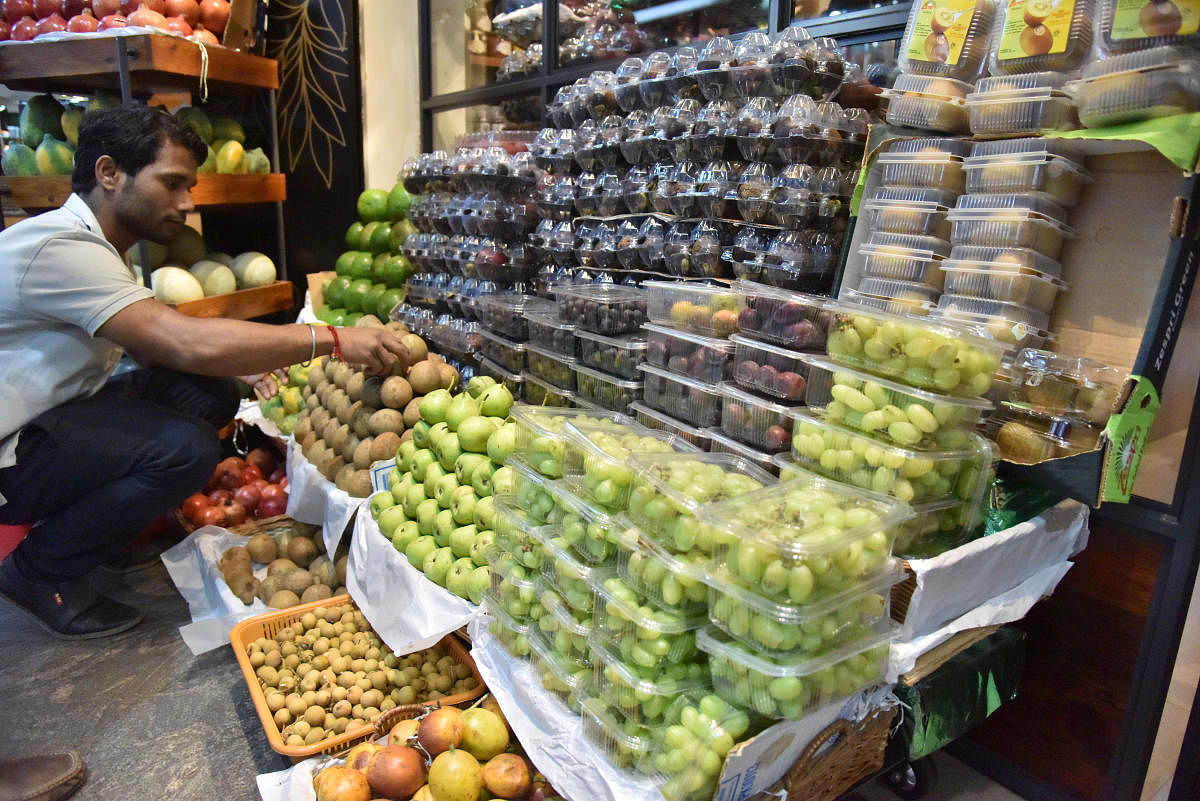
From September 1, officials are going about curbing plastic use with renewed vigour.
The BBMP and the Karnataka State Pollution Control Board (KSPCB) are the two agencies mandated with monitoring and curbing plastic use.
Officials of the BBMP’s health department are conducting raids on restaurants, online grocery platforms and supermarkets.
Randeep D, special commissioner, BBMP, says a statewide ban on single-use plastic has been in force since 2016. “It is just that the enforcement was poor. Now, marshals will scan and fine offenders every day,” he says.
The BBMP is looking at all forms of plastic, and its officials on the field are now empowered to levy penalties and fines, he told Metrolife. The law allows the shutting down of establishments using banned plastic. “This adds strength to the enforcement,” he says. Even users of plastic-wrapped items will be fined, he warned.
Randeep says all forms of plastic, except food containers and water bottles, fall under the ban. “We will come down heavily on establishments that use thin plastic to wrap food, fruits and vegetables,” he says.
Consumers using plastic will be fined Rs 500 for the first offence and Rs 1,000 for subsequent offences, while traders selling banned plastic will be fined
Rs 50,000 for the first offence and Rs 1 lakh for repeat violations. The steep fines are based on a National Green Tribunal (NGT) order, he says.
Dr Manoranjan Hegde, senior health inspector, BBMP, says officials have always seized plastics with a thickness of less than 50 microns.
“The total plastic seized between 2015 and 2019 (till July) is 25.6 lakh kilos and the fine collected is Rs 3.27 crore. This includes all four BBMP zones in Bengaluru,” he says.
The officials have now stepped up the pace and started seizing ready-to-use plastic packing material. “We carry a gauge meter which helps us check the micron level. For commercial users, we levy a fine of up to Rs 25,000 for a first-time offender. The amount could go up to Rs 50,000 as well, depending on the gravity of the offence,” Hegde says.
EYE ON FACTORIES
Dr K Sudhakar, chairman Karnataka State Pollution Control Board, is concerned plastic waste is being dumped in lakes and in landfills. “My first focus is to ensure that lakes and rivers are saved. Plastic contaminates the environment and causes permanent damage to soil and water,” he told Metrolife.
The primary target now is the thin plastic wrapping used to pack fruits and vegetables. “When you say organic vegetables and wrap it in plastic, you are actually selling something that is coated with a chemical. Plastic containers that sell fruits will soon be replaced by eco-friendly material. We are in talks with vendors,” says Sudhakar.
Pollution control authorities are authorised to issue closure notices to manufacturers of plastic. “The fine could start at Rs 10,000 and run into crores. We will start our drive at the manufacturing level soon. We intend to sensitise manufacturers, buyers and sellers, and also instil a sense of fear in them,” he says.
Dr T V Ramachandra, Centre for Ecological Sciences, IISc, says environmental illiteracy is poor, and promotes plastic. “Polythene takes longer to degrade. There is a phenomenon of photodegradation - wherein plastic breaks into small pieces, which gets into the food chain (fish, etc) and gets into our food chain,” he says.
Non-biodegradable material, manufactured from petroleum, contaminates the soil, water and environment, explains Ramachandra. When thin plastic is used to wrap food, the chemicals get into our food chain.
“It happens directly when food is carried in polythene pouches or through animals, milk and meat,” he adds. The health risks are huge, and include cancer, he warns.
In figures
25.6 lakh kg
Plastic seized
~ 3.27 crore
Fine collected
(Between 2015 and 2019 July)
Why shun plastic
Plastic bags clog drains, contaminate soil and water.
Burning of plastic emits toxic gases.
Plastic breaks into minute particles. They get into our food chain.
Livestock eat plastic and it ends up on our plate.
Penalties across board
Trading, retailing, selling of banned plastic items: Fine between Rs 50,000 and Rs 1 lakh.
Commercial users: Fine between Rs 25,000 and Rs 50,000.
Domestic users: Fine between Rs 500 and Rs 1,000
Penalties as specified under the BBMP’s Plastic Ban Notification of 2016 and its amendments.